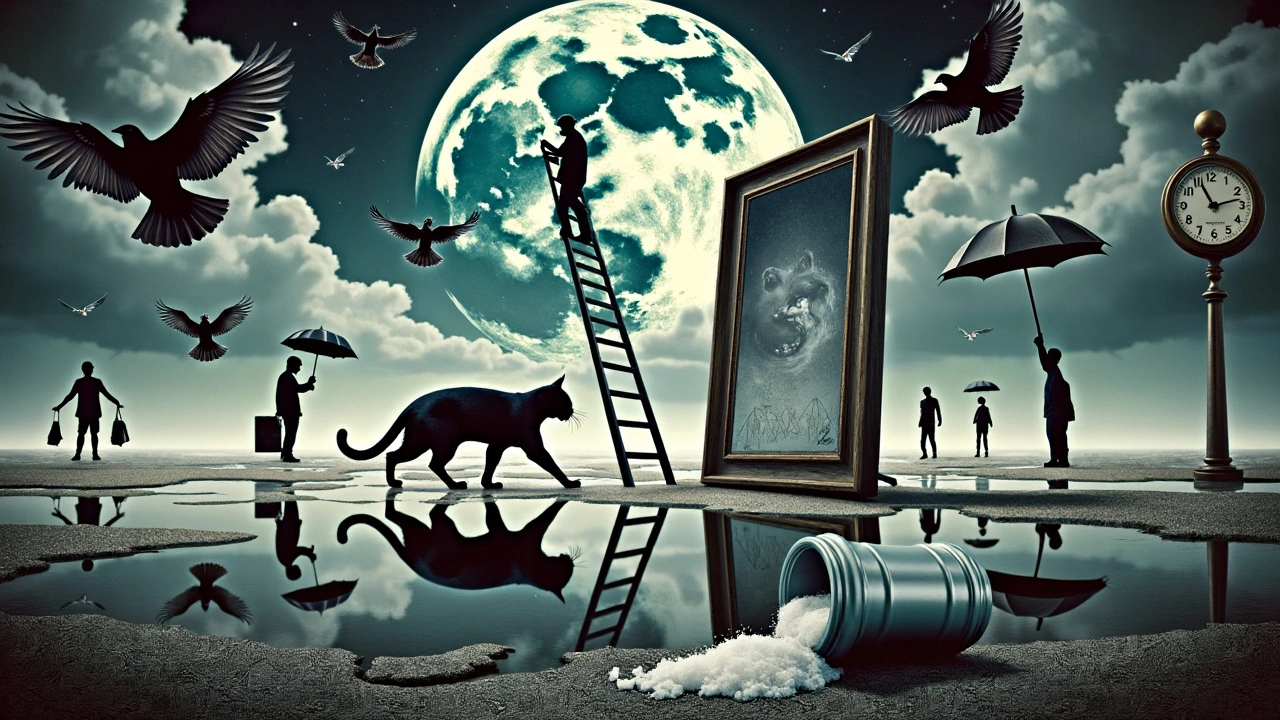Exploring the Superstitions of Friday the 13th
The idea of Friday the 13th being an unlucky day has captivated people's imaginations for years, deeply ingrained in various cultures around the world. This date, which appears at least once every year and sometimes up to three times, is famously linked to a range of superstitions and eerie tales. While many dismiss these beliefs as mere folklore, a significant number of individuals retain a certain level of apprehension or curiosity about the day. The roots of these superstitions are entwined with historical events, religious stories, and societal myths.
A Historical and Religious Perspective
The origins of the superstition surrounding Friday the 13th are varied and often debated. One of the most commonly recounted stories traces back to the Biblical event of the Last Supper. According to Christian tradition, thirteen individuals were present at this meal, which included Jesus and his twelve apostles. Among them was Judas Iscariot, the one who would betray Jesus. The day following the Last Supper, known as Good Friday, marked the crucifixion of Jesus Christ. This association between the number 13 and a fateful Friday has embedded itself in the lore surrounding this ominous date.
Another historical reference ties the origins of this superstition to the medieval era. On Friday, October 13th, 1307, King Philip IV of France ordered the arrest of the Knights Templar, a religious and military order. The Templars were subsequently tortured and executed, further enforcing the negative stigma attached to this date. These events have contributed to the fear and unease that some feel on Friday the 13th, blending ancient religious stories with historical occurrences to create a potent mix of superstition.
Triskaidekaphobia: Fear of the Number 13
An important aspect of Friday the 13th’s superstition is triskaidekaphobia, the intense fear of the number 13. This phobia is surprisingly common and has been known to influence various aspects of everyday life. Many buildings, especially hotels and high-rises, often skip labeling the 13th floor, jumping from 12 to 14 in their numbering. Similarly, some airlines avoid having a 13th row in their seating arrangements, catering to the apprehensions of passengers who might feel uneasy about flying on this day.
Triskaidekaphobia doesn't only affect large establishments; it also influences individual behaviors. On Friday the 13th, many people consciously avoid significant activities such as getting married, making large purchases, or starting new business ventures. This widespread avoidance highlights the extent to which superstitions can permeate daily life, even in contemporary society where rational thought and skepticism often prevail.
Living with Superstition in Modern Times
Despite the pervasive belief in the unlucky nature of Friday the 13th, a large portion of the population continues with their routine activities without giving the date much thought. For these individuals, the day is no different from any other on the calendar. Many view the superstitions as an interesting aspect of cultural heritage but do not allow them to impact their actions or choices. This dichotomy illustrates humanity's complex relationship with superstition, where curiosity lives alongside pragmatism.
The skepticism surrounding Friday the 13th is often coupled with a playful acknowledgment of its fame. Popular culture has embraced the date, cementing its place in horror genres notably illustrated through the "Friday the 13th" film franchise. These movies have capitalized on the fears and superstitions connected to the day, adding to its mystique and ensuring that the lore continues to be passed down through generations.
The Cultural Phenomenon of Friday the 13th
Friday the 13th remains one of those cultural phenomena that consistently sparks interest and conversation. Whether examining its historical roots or debating its impact on modern behavior, there is no denying the compelling nature of this date. It serves as a focal point for discussions about the irrational fears that still find a place in our technologically advanced and often skeptical world. Even as many shrug off the superstitions, others find a sense of community and entertainment in perpetuating the tales.
The blend of history, religion, and cultural storytelling has created a rich tapestry of superstition that surrounds Friday the 13th. While there may not be empirical evidence to support the claim that the day is indeed unlucky, the stories and beliefs attached to it continue to captivate and intrigue. Whether one chooses to honor these superstitions or simply observe them from a distance, there is no denying that Friday the 13th holds a unique place in the collective consciousness.

Conclusion: The Persistent Allure of Friday the 13th
In the end, Friday the 13th is a day that exemplifies the enduring power of superstitions and cultural myths. It acts as a reminder of how historical events and stories can continue to influence modern society in subtle yet noticeable ways. While some approach the date with a hint of trepidation and others with outright dismissal, its ability to provoke thought and discussion makes it one of the most fascinating dates on our calendars. The allure of Friday the 13th lies not just in fear, but in its testament to human curiosity, the love of storytelling, and the persistent intrigue of the unknown.

Paul KEIL
September 13, 2024 AT 22:44Triskaidekaphobia is just cultural conditioning, nothing mystical.
Horace Wormely
September 14, 2024 AT 09:46While the fear of the number 13 may seem irrational, it has measurable effects on architecture and airline seating. Companies often skip the 13th floor or row to accommodate passenger comfort. This practice reinforces the superstition by giving it institutional legitimacy. Moreover, cognitive bias leads people to remember negative events on Friday the 13th more vividly. In reality, statistical analyses show no increase in accidents on that date.
christine mae cotejo
September 15, 2024 AT 10:46The tapestry of Friday the 13th superstition is woven from threads that span centuries, cultures, and individual psychologies. From the biblical tableau of the Last Supper, where thirteen diners gathered under a looming betrayal, to the medieval crackdown on the Knights Templar on a cursed Friday, each narrative adds a layer of dread. Modern psychology tells us that triskaidekaphobia, the fear of the number thirteen, is a manifestation of our brain's penchant for pattern recognition and aversion to uncertainty. When a day carries both a numerological oddity and a historically ominous alignment, our collective imagination seizes upon it, amplifying anxiety. Hotel managers and airline companies, fearing passenger discomfort, deliberately omit the number thirteen from floor or row designations, a logistical decision that subtly validates the myth. This feedback loop - belief influencing design, design reinforcing belief - perpetuates the superstition across generations. Studies have shown that on Fridays the 13th, people are more likely to report minor mishaps, a classic case of confirmation bias where expected outcomes are more readily recalled. Meanwhile, the media and entertainment industry capitalizes on the fear, feeding it back into the public consciousness through horror movies, thriller novels, and sensational headlines. The infamous "Friday the 13th" film franchise, with its iconic masked killer, does more than just entertain; it cements the day's association with terror in the cultural psyche. Yet, for many, the date passes unnoticed, a neutral point on the calendar marked only by a quirky anecdote. This dichotomy highlights a broader human truth: we are simultaneously rational beings and myth-making creatures. The persistence of Friday the 13th superstition is a testament to our love of storytelling, our desire for communal rituals, and the comfort we find in shared, if irrational, fears. In the end, whether you lock your doors, avoid climbing ladders, or simply chuckle at the hype, the day serves as a reminder that belief shapes experience as much as empirical fact does. So, when that calendar flips to the 13th, consider it an invitation to reflect on how narratives shape our reality, not merely an omen to dread.
Douglas Gnesda
September 15, 2024 AT 12:10Building on the historical context, it's worth noting that the 1307 Templar arrests happened on a Friday, but the specific day of the month was the 13th of October. This coincidence fuels the narrative that authority-driven trauma can imprint itself onto cultural memory. Contemporary research in behavioral economics suggests that such anchoring effects can affect decision‑making for years, especially when reinforced by media. So the superstition isn't just a spooky story; it has measurable economic implications, from hotel pricing strategies to insurance risk assessments.
Abhijit Pimpale
September 15, 2024 AT 13:33The avoidance of the 13th floor is a practical solution to a psychological problem, not evidence of any real curse.
Eric DE FONDAUMIERE
September 15, 2024 AT 14:23Exactly! Companies just want customers to feel safe, so they skip 13. It's simple marketing, not magic.
Pauline Herrin
September 15, 2024 AT 16:20While the historical anecdotes are fascinating, the modern dispelling of these myths through rational analysis remains essential for an enlightened society.
pradeep kumar
September 15, 2024 AT 17:43Enlightened, sure, but people love a good horror story; dismissing it outright ignores the communal joy of shared folklore.